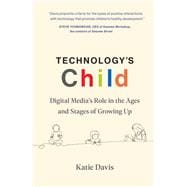How children engage with technology at each stage of development, from toddler to twentysomething, and how they can best be supported.
What happens to the little ones, the tweens, and the teenagers, when technology—ubiquitous in the world they inhabit—becomes a critical part of their lives? This timely book brings much-needed clarity to what we know about technology’s role in child development. Better yet, it provides guidance on how to use what we know to help children of all ages make the most of their digital experiences.
From toddlers who are exploring their immediate environment to twentysomethings who are exploring their place in society, technology inevitably and profoundly affects their development. Drawing on her expertise in developmental science and design research, Katie Davis describes what happens when child development and technology design interact, and how this interaction is complicated by children’s individual characteristics and social and cultural contexts. Critically, she explains how a self-directed experience of technology—one initiated, sustained, and ended voluntarily—supports healthy child development, especially when it takes place within the context of community support.
Children’s experiences with technology—their “screen time” and digital social relationships—have become an inescapable aspect of growing up. This book, for the first time, identifies the qualitative distinctions between different ages and stages of this engagement, and offers invaluable guidance for parents and teachers navigating the digital landscape, and for technology designers charting the way.








